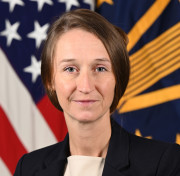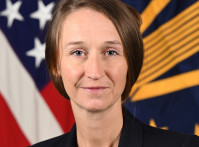-
Relief, Recovery, and Peace: Iris Ferguson on COP28’s New Theme
November 13, 2023 By Wilson Center Staff In a new mini-series previewing the upcoming UN Climate Summit (COP28)’s new focus on relief, recovery, & peace, ECSP Program Director Lauren Risi spoke with Iris Ferguson, the US Department of Defense’s Deputy Assistant Secretary of Defense for Arctic and Global Resilience.
In a new mini-series previewing the upcoming UN Climate Summit (COP28)’s new focus on relief, recovery, & peace, ECSP Program Director Lauren Risi spoke with Iris Ferguson, the US Department of Defense’s Deputy Assistant Secretary of Defense for Arctic and Global Resilience.Deputy Assistant Secretary Ferguson spoke about why climate security has become a crucial element in DOD planning, as well as why the department will have a highly visible presence at COP28. She also shared the story of her own path to leadership at the Pentagon – as well as why her position includes both global resilience and the Arctic.
In a new mini-series previewing the upcoming UN Climate Summit (COP28)’s new focus on relief, recovery, & peace, ECSP Program Director Lauren Risi spoke with Iris Ferguson, the US Department of Defense’s Deputy Assistant Secretary of Defense for Arctic and Global Resilience.
Deputy Assistant Secretary Ferguson spoke about why climate security has become a crucial element in DOD planning, as well as why the department will have a highly visible presence at COP28. She also shared the story of her own path to leadership at the Pentagon – as well as why her position includes both global resilience and the Arctic.
Read selected highlights of our discussion below – and listen to the entire conversation here: Relief, Recovery, and Peace: Iris Ferguson on COP28’s New Theme
On why the Department of Defense created a position linking the Arctic and global resilience.
What does that mean in practice? It means looking at the Arctic region. How it’s unfolding, and a myriad of ways our competitors are acting in the region, [and] understanding what it means for the military and how we operate there. Do we have the right capabilities? Do we have the right enabling capabilities like communications and domain awareness? And how are we working with our allies and partners to ensure that we have interoperability—and that we’re working together in order to keep the region peaceful and stable in the long term.
On global resilience, we’re really charged with looking at how the department is interpreting and thinking about climate risk and climate change. We’re trying to infuse climate within our myriad of documents and topics around climate change and climate risk, and to our national defense strategy, international security strategy…. We’re looking at leveraging the immense transition that’s happening with energy, and how the DoD is positioning itself to be in a position of strategic advantage as we navigate the transition not only as a society, but also as an agency.
On how the Biden Administration’s increasing focus on climate security looks from a DoD perspective:
I think we’re seeing it prioritized in a number of ways. The first is certainly the creation of my office. It’s a good sign that they’re taking the climate crisis seriously, and are trying to put some really heavy strategic thinking to what the department needs to do to be able to navigate the climate crisis.
But this is also not something that’s new in a lot of ways for the DoD as well. It’s at maybe a difference in emphasis. But the interests the DOD has a navigating climate crisis are long standing. We have a huge footprint… We have operations around the globe. And we have a real need to ensure that we have the right housing, equipping training, that we are prepared for a changing operating environment….
[The Defense Climate Risk Assessment of 2021] outlines some of the challenges to our operating environment in our theatres, where we see the potential drivers of instability and conflict in a variety of theatres …. We’re really thinking heavily and listening to our partners in a lot of ways … as they say that climate security, the climate challenge, is one of their most critical—if not their most important—national security threat. So a lot of the work of my office is actually looking at how we’re working with our allies and partners to bolster their climate resilience.
On why the Department of Defense plans to have a strong presence at COP28:
“We’re really pleased to have the opportunity to lend our voice to the discussions that are happening at [COP28], especially given the focus this year on relief, recovery, and peace…. We’ll have our largest and most senior delegation that we’ve ever had at COP this year, which is a testament again, to the focus that this administration and the DoD are putting on trying to navigate the climate crisis. Last year, when we attended for the first time, we had heard a lot of our partners wanting more US DoD leadership in this space. And so, we’re excited to be able to go back and have a bit more of a delegation this year.
We’re also really excited that at COP… we here at DoD that we hear from voices outside of the Defense Department. This is a really great opportunity for us to hear about other issues. Often the Pentagon, you are in a bit of an echo chamber at times. So, we’re really excited to hear perspectives outside of the DoD.”
On ensuring that climate change continues to be a key part of the DoD agenda:
That’s one of the privileges of having an office and policy, quite frankly, that is charged with this exact challenge: How do you ensure that in everything you’re doing, you’re considering climate and the energy transition as part of the foundational rubric? Where is the risk that is on the horizon – that needs to be part of the equation, as you’re thinking about different conflicts that arise? Whether it be the Ukraine war, [for example], which has seen a lot of actual lessons learned around operational energy, and how we transport fuel, and how we provide real necessary capabilities to our Ukrainian partners. There’s a real climate and energy nexus to that, whether it be you know, ensuring that we have the right fuel distribution, or that we encourage the right distributed generation of energy there, or the logistics train that has had challenges because of the changing soil content.
So, there’s a lot of eye opening, I think, happening around this topic. I’m continuing to make sure that it’s part of the broader risk calculus that we need to consider going forward, because it makes strategic sense.
Photo Credit: Headshot of Deputy Assistant Secretary Iris Ferguson, Courtesy of the U.S. Department of Defense.
 A Publication of the Stimson Center.
A Publication of the Stimson Center.

 In a new mini-series previewing the upcoming UN Climate Summit (COP28)’s new focus on relief, recovery, & peace, ECSP Program Director Lauren Risi spoke with Iris Ferguson, the US Department of Defense’s Deputy Assistant Secretary of Defense for Arctic and Global Resilience.
In a new mini-series previewing the upcoming UN Climate Summit (COP28)’s new focus on relief, recovery, & peace, ECSP Program Director Lauren Risi spoke with Iris Ferguson, the US Department of Defense’s Deputy Assistant Secretary of Defense for Arctic and Global Resilience.





